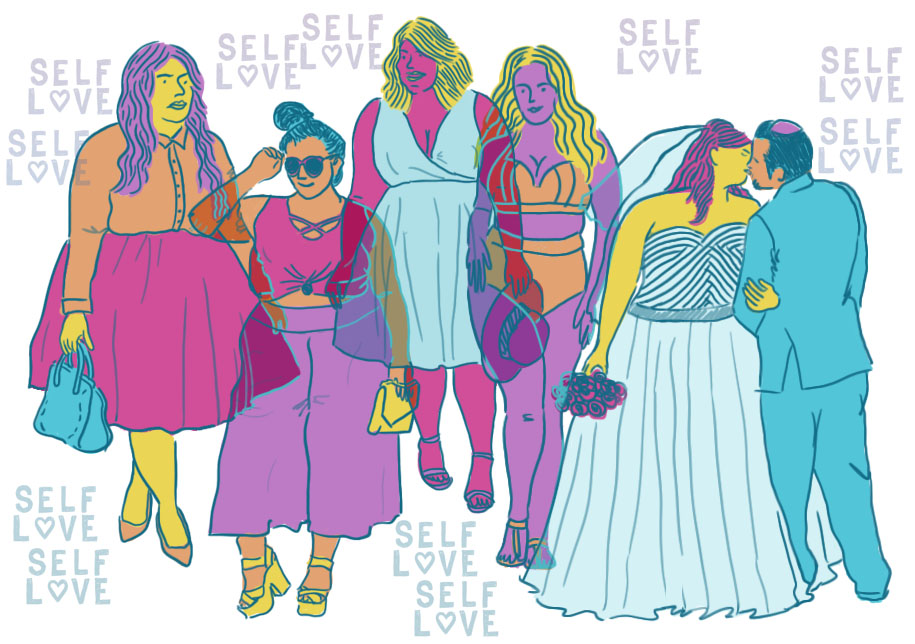I’ve never written about my weight before, but not because of the embarrassment or shame I am expected to carry with me as society’s imposed penance for being bigger than a size 6.
I’ve never written about my weight for the same reasons I also don’t really talk about it: It makes other people uncomfortable. My skinnier friends visibly wince, look away, or immediately come to my supposed defense whenever I complain about plus-sized clothes or joke about being chubby. They say, “You’re not fat, you’re beautiful.” As if those two things are mutually exclusive.
Truth be told, I love my body. I love being curvy. I love clothes and wearing what I feel good in. And I love food. I truthfully enjoy being zaftig.
Zaftig is one of those semi-elusive words that refuses to be translated easily into the English language. Yiddish in origin, it is a way to call a woman plump, curvy, even luscious, but without a negative sting or rude connotation.
And at a time when many Jewish women and girls, especially those who are Orthodox, are facing disproportionately high rates of eating disorders and warped body-image, I think it’s time to reclaim zaftig.

Food and Judaism go so hand in hand that when I think of my own upbringing, I always picture holiday meals, the specialty dishes for each holiday, and second and third helpings of latkes, kugel, brisket. I’m sure many fellow Jews have similar recollections. But perhaps our association with food is also leading to unhealthy habits and disordered eating.
The American Journal of Psychiatry has found that 25 percent of Jewish females ages 13 to 20 reported eating disorder behaviors, compared with 18 percent in other religious affiliations. What is it about Judaism that’s factoring into this staggering difference?
In some homes, a Shabbat meal is synonymous with a Thanksgiving meal, except it happens every week instead of once a year. Shabbat consists of three meals: Friday night dinner, Saturday morning, Saturday lunch, and sometimes dinner, depending on what time Shabbat ends in the evening. Some women report that they will fast in the days leading up to Shabbat to fully partake in the feasts without compromising calories.
Jews also have complicated and extensive regulations when it comes to food. From kosher laws to multiple prayers said over food, eating while Jewish can be an arduous process. Rarely can observant Jews, especially in the diaspora, eat without care and thought. This heightened attention to food could be a link to the disordered way women eat.
And then it comes to the shidduch, or match. The stereotype of a Jewish mother constantly trying to set up her children is not entirely misguided. There is enormous pressure in Jewish culture to find a good partner, marry, and have lots of nice, Jewish babies. Being skinny and beautiful can feel integral to this process.
And I get it. I know what it’s like to feel shamed by people who are close to you. I have early memories of female family members patting my belly and telling me to “suck in.” At 7 years old, another suggested I go on Weight Watchers. Seven. Years. Old. Recently, one bought me expensive shapewear for my birthday.
Body issues run deep in the Jewish community and it’s incredibly hard not to be affected by them. I’ve struggled with how other people have viewed my body. I went to a Jewish summer camp where we had to sit with people who weren’t in our bunks, to “foster community.” But I had a very difficult time eating comfortably in front of other kids and felt like every bite that I put into my mouth was being judged.
But accepting that I am zaftig is accepting who I am. Because it’s not a secret that I am zaftig. I can’t hide it, and I no longer want to. I no longer want to cater to my skinnier friends’ comfort levels when I talk about finding cute clothes in my size. I no longer want to choose not to eat second helpings or ice cream in public for fear of being judged on what I choose to consume.
And being zaftig also means that I accept that any “match” I end up with will love me for who I am, curves and all. My match won’t love me despite being zaftig.
And I’m not the only Jewish woman pushing back. Recently, Lena Dunham posted a thoughtful Instagram of “before and after” pictures of her weight gain, saying she was happier leaning into her body than she had ever been before.
I’ve realized that I never disliked my body. Other people did. The struggles I was having to accept myself didn’t stem from my thoughts. They stemmed from what others thought. And I had been internalizing them. When I slowly began to tune out the bullshit, stop seeing myself through another’s lens, and learn to enjoy how I look, I freed myself.
Besides, there’s another very important Jewish value to consider here: “B’tselem Elohim,” or “made in God’s image.” It’s a saying to remind us that we all have a little bit of the divine within us and our bodies are made exactly the way they were supposed to be made. And yes, that includes bodies that are zaftig, like mine.
Header illustration by Fernanda Sanovicz



